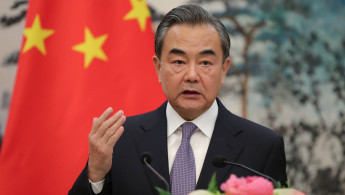Follow us on Twitter: @The_NewArab
China rejects UN probe into Rohingya genocide amid Uighur crackdown
China has said it does not support "complicating, expanding or internationalising" the mass human rights violations committed against Myanmar's Rohingya Muslims, after it voted against a UN investigation into the crisis.
“The Rakhine state issue is in essence an issue between Myanmar and Bangladesh. China does not approve of complicating, expanding or internationalising this issue,” Wang Yi, one of China's top diplomats told the Bangladeshi Foreign Minister, according to a statement issued by the Chinese foreign ministry on Friday.
Despite China's objection, the UN Human Rights Council voted on Thursday to establish a panel to prepare criminal indictments over atrocities committed in Myanmar, amid allegations of genocide against the Rohingya minority.
Thirty-five of the council's 47 members voted in favour of the resolution and only three - China, the Philippines and Burundi - voted against.
Some 700,000 Muslims fled Rakhine state in Myanmar for refuge in neighbouring Bangladesh, according to a UN report published earlier this month.
The report details atrocities committed by Myanmar's troops, aided by ethnic Rakhine mobs, including murder, rape, arson and torture, and concludes that unfathomable levels of violence were used against the Rohingya, with a total disregard for human life.
Read more: The Uighur Muslim crisis is worse than you think
This stance has chilling echoes to the policies being undertaken by the strictly secular Chinese government against Uighur and other Turkic Muslims living in the northwest, under the pretext of preventing religious extremism and a separatist uprising.
The UN estimates some 1 million Uighur Muslims are being held in so-called "re-education camps" where they are forced to denounce Islam and declare their support for the communist party, and face torture if they refuse to do so. Some have died in custody.
The government tightened its crackdown on Muslims in the past few years, including imposing restrictive surveillance policies in the Xinjiang region, where most Uighur live. The authorities have confiscated passports and phones belonging to the Uighur, and installed GPS devices on their vehicles and use facial recognition technology to track their movements.
The UN said the Uighurs and other Muslims are being treated as "enemies of the state," based purely on their ethno-religious identity.
Agencies contributed to this report.





 Follow the Middle East's top stories in English at The New Arab on Google News
Follow the Middle East's top stories in English at The New Arab on Google News
![The UAE is widely suspected of arming the RSF militia [Getty]](/sites/default/files/styles/image_330x185/public/2024-11/GettyImages-472529908.jpg?h=69f2b9d0&itok=Yauw3YTG)
![Netanyahu furiously denounced the ICC [Getty]](/sites/default/files/styles/image_330x185/public/2024-11/GettyImages-2169352575.jpg?h=199d8c1f&itok=-vRiruf5)
![Both Hamas and the Palestinian Authority welcomed the ICC arrest warrants [Getty]](/sites/default/files/styles/image_330x185/public/2024-11/GettyImages-2178351173.jpg?h=199d8c1f&itok=TV858iVg)